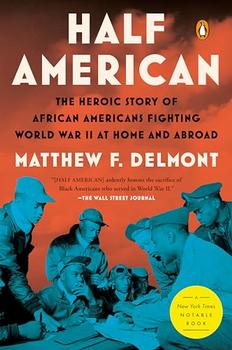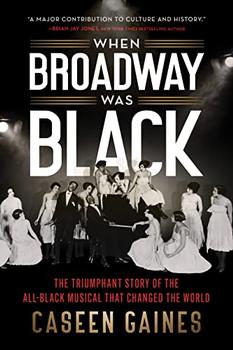Summary | Excerpt | Reviews | Beyond the book | Read-Alikes | Genres & Themes | Author Bio

The Epic Story of African Americans Fighting World War II at Home and Abroad
by Matthew DelmontThe definitive history of World War II from the African American perspective, written by civil rights expert and Dartmouth history professor Matthew Delmont.
Over one million Black men and women served in World War II. Black troops were at Normandy, Iwo Jima, and the Battle of the Bulge, serving in segregated units and performing unheralded but vital support jobs, only to be denied housing and educational opportunities on their return home. Without their crucial contributions to the war effort, the United States could not have won the war. And yet the stories of these Black veterans have long been ignored, cast aside in favor of the myth of the "Good War" fought by the "Greatest Generation."
Half American is American history as you've likely never read it before. In these pages are stories of Black heroes such as Thurgood Marshall, the chief lawyer for the NAACP, who investigated and publicized violence against Black troops and veterans; Benjamin O. Davis, Jr., leader of the Tuskegee Airmen, who was at the forefront of the years-long fight to open the Air Force to Black pilots; Ella Baker, the civil rights leader who advocated on the home front for Black soldiers, veterans, and their families; James Thompson, the 26-year-old whose letter to a newspaper laying bare the hypocrisy of fighting against fascism abroad when racism still reigned at home set in motion the Double Victory campaign; and poet Langston Hughes, who worked as a war correspondent for the Black press. Their bravery and patriotism in the face of unfathomable racism is both inspiring and galvanizing. In a time when the questions World War II raised regarding race and democracy in America remain troublingly relevant and still unanswered, this meticulously researched retelling makes for urgently necessary reading.
Strategically, Delmont begins not with any widely known WWII event but with the black press and their sphere of influence. While it was somewhat in vogue to not fight the "white man's war," the black press promoted their own creation, a "Double V" campaign which signified victory both against inequality at home and against fascism overseas. In the meantime, the U.S. Army refused to integrate its segregated units, curiously saying they were not interested in "sociological experiments." Despite not always being recognized at the time, there are many examples of black excellence and brilliance during WWII, perhaps the best known today being the Tuskegee Airmen. Deployed in June of 1943, they were the first black American pilots to fly in combat. Movies have been made about the Tuskegee Airmen; Red Tails comes to mind. But Delmont focuses on many other examples of black people who participated in the war as well...continued
Full Review
(947 words)
This review is available to non-members for a limited time. For full access,
become a member today.
(Reviewed by Valerie Morales).
Before he was hanged for his alleged role in the Camp Logan Mutiny, Army Pfc. Thomas Hawkins wrote a letter to his mother and father. It was both poignant and simple. "When this letter reaches you, I will be beyond the veil of sorrow. I will be in heaven with the angels…I am not guilty of the crime that I am accused of but Mother it is God's will that I go now." The crime Hawkins had been accused of playing a part in was the murder of 16 whites during a riot in segregated Houston, Texas in 1917. At least four black soldiers were also killed.
In Half American: The Epic Story of African Americans Fighting World War II at Home and Abroad, Matthew Delmont draws attention to the hostile and racist atmospheres that black American...
This "beyond the book" feature is available to non-members for a limited time. Join today for full access.

If you liked Half American, try these:

by Kellie Carter Jackson
Published 2024
A radical reframing of the past and present of Black resistance—both nonviolent and violent—to white supremacy.

by Caseen Gaines
Published 2023
The triumphant story of how an all-Black Broadway cast and crew changed musical theatre—and the world—forever.
Discovery consists of seeing what everybody has seen and thinking what nobody has thought.
Click Here to find out who said this, as well as discovering other famous literary quotes!